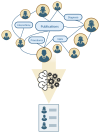Artificial Intelligence Algorithms for Expert Identification in Medical Domains: A Scoping Review
- PMID: 38785576
- PMCID: PMC11119077
- DOI: 10.3390/ejihpe14050078
Artificial Intelligence Algorithms for Expert Identification in Medical Domains: A Scoping Review
Abstract
With abundant information and interconnectedness among people, identifying knowledgeable individuals in specific domains has become crucial for organizations. Artificial intelligence (AI) algorithms have been employed to evaluate the knowledge and locate experts in specific areas, alleviating the manual burden of expert profiling and identification. However, there is a limited body of research exploring the application of AI algorithms for expert finding in the medical and biomedical fields. This study aims to conduct a scoping review of existing literature on utilizing AI algorithms for expert identification in medical domains. We systematically searched five platforms using a customized search string, and 21 studies were identified through other sources. The search spanned studies up to 2023, and study eligibility and selection adhered to the PRISMA 2020 statement. A total of 571 studies were assessed from the search. Out of these, we included six studies conducted between 2014 and 2020 that met our review criteria. Four studies used a machine learning algorithm as their model, while two utilized natural language processing. One study combined both approaches. All six studies demonstrated significant success in expert retrieval compared to baseline algorithms, as measured by various scoring metrics. AI enhances expert finding accuracy and effectiveness. However, more work is needed in intelligent medical expert retrieval.
Keywords: artificial intelligence; expert finding; expert identification; knowledge management; language model; machine learning.
Conflict of interest statement
The authors declare no conflicts of interest.
Figures




Similar articles
-
Consensus statements on the current landscape of artificial intelligence applications in endoscopy, addressing roadblocks, and advancing artificial intelligence in gastroenterology.Gastrointest Endosc. 2025 Jan;101(1):2-9.e1. doi: 10.1016/j.gie.2023.12.003. Epub 2024 Apr 17. Gastrointest Endosc. 2025. PMID: 38639679
-
Approaches for the Use of AI in Workplace Health Promotion and Prevention: Systematic Scoping Review.JMIR AI. 2024 Aug 20;3:e53506. doi: 10.2196/53506. JMIR AI. 2024. PMID: 38989904 Free PMC article.
-
Artificial intelligence technologies and compassion in healthcare: A systematic scoping review.Front Psychol. 2023 Jan 17;13:971044. doi: 10.3389/fpsyg.2022.971044. eCollection 2022. Front Psychol. 2023. PMID: 36733854 Free PMC article.
-
Ambient Assisted Living: Scoping Review of Artificial Intelligence Models, Domains, Technology, and Concerns.J Med Internet Res. 2022 Nov 4;24(11):e36553. doi: 10.2196/36553. J Med Internet Res. 2022. PMID: 36331530 Free PMC article.
-
The Role of Artificial Intelligence in Decoding Speech from EEG Signals: A Scoping Review.Sensors (Basel). 2022 Sep 15;22(18):6975. doi: 10.3390/s22186975. Sensors (Basel). 2022. PMID: 36146323 Free PMC article.
Cited by
-
Deep Learning-Based Aortic Diameter Measurement in Traumatic Hemorrhage Using Shallow Attention Network: A Path Forward.Diagnostics (Basel). 2025 May 23;15(11):1312. doi: 10.3390/diagnostics15111312. Diagnostics (Basel). 2025. PMID: 40506884 Free PMC article.
References
-
- Hofmann K., Balog K., Bogers T., de Rijke M. Contextual factors for finding similar experts. J. Am. Soc. Inf. Sci. Technol. 2010;61:994–1014. doi: 10.1002/asi.21292. - DOI
-
- Lu H. Personalized Expert Recommendation: Models and Algorithms. 2017. [(accessed on 8 March 2024)]. Available online: https://oaktrust.library.tamu.edu/handle/1969.1/173103.
-
- Balog K., Fang Y., De Rijke M., Serdyukov P., Si L. Expertise retrieval. Found. Trends Inf. Retr. 2012;6:127–256. doi: 10.1561/1500000024. - DOI
-
- Moreira C., Calado P., Martins B. Learning to rank academic experts in the DBLP dataset. Expert Syst. 2015;32:477–493. doi: 10.1111/exsy.12062. - DOI
-
- Mookiah L., Eberle W. Co-Ranking Authors in Heterogeneous News Networks; Proceedings of the 2016 International Conference on Computational Science and Computational Intelligence, CSCI 2016; Las Vegas, NV, USA. 15–17 December 2016; - DOI
Publication types
Grants and funding
LinkOut - more resources
Full Text Sources
Miscellaneous

